

Sun Yat-sen. Sun's chief legacy resides in his developing of the political philosophy known as the Three Principles of the People: nationalism (non-ethnic, independence from imperialist domination), democracy (to Western standards), and the people's livelihood (free trade capitalism and Georgist tax reform[4]).[5][6] Names[edit] Sun was born as Sun Wen (Cantonese: Syūn Màhn; 孫文), and his genealogical name was Sun Deming (Syūn Dāk-mìhng; 孫德明).[1][7] As a child, his "milk name" was Dixiang (Dai-jeuhng; 帝象).[1] Sun's courtesy name was Zaizhi (Jai-jī; 載之), and his baptized name was Rixin (Yaht-sān; 日新).[8] While at school in Hong Kong he got the name Yat-sen (Chinese: 逸仙; pinyin: Yìxiān).[9] Sūn Zhōngshān (孫中山), the most popular of his Chinese names, came from the "Nakayama" (中山) of Nakayama Shō (中山樵), the Japanese name given to him by Tōten Miyazaki.[1]
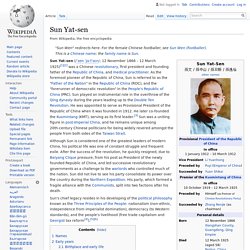
Hussein Badreddin al-Houthi. Personal life[edit] Al-Houthi was born in 1956 in the Marran area of Sada'a region.
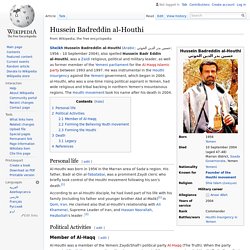
His father, Badr al-Din al-Tabatabai, was a prominent Zaydi cleric who briefly took control of the Houthi movement following his son's death.[1] According to an al-Houthi disciple, he had lived part of his life with his family (including his father and younger brother Abd al-Malik)[1] in Qom, Iran. He claimed also that al-Houthi's relationship with Ali Khamenei, Supreme Leader of Iran, and Hassan Nasrallah, Hezbollah's leader .[2]
Houthis. Not to be confused with Hutu.
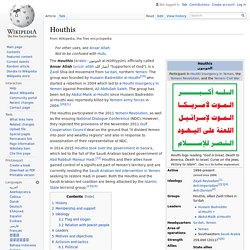
The Houthis (Arabic: الحوثيون al-Ḥūthiyyūn), officially called Ansar Allah (anṣār allāh أنصار الله "Supporters of God"), is a Zaidi Shia-led movement from Sa'dah, northern Yemen. The group was founded by Hussein Badreddin al-Houthi[19] who started a rebellion in 2004 which led to a Houthi insurgency in Yemen against President, Ali Abdullah Saleh. Joseph Pulitzer. Joseph Pulitzer ( In the 1890s the fierce competition between his World and William Randolph Hearst's New York Journal caused both to use yellow journalism for wider appeal; it opened the way to mass-circulation newspapers that depended on advertising revenue and appealed to readers with multiple forms of news, entertainment and advertising.
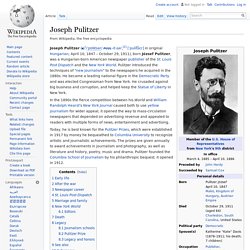
Today, he is best known for the Pulitzer Prizes, which were established in 1917 by money he bequeathed to Columbia University to recognize artistic and journalistic achievements. Cecilia Payne-Gaposchkin. Cecilia Helena Payne-Gaposchkin (May 10, 1900 – December 7, 1979) was a British–American astronomer and astrophysicist who, in 1925, proposed in her Ph.D. thesis an explanation for the composition of stars in terms of the relative abundances of hydrogen and helium.[1] Early life[edit] Cecilia Helena Payne was one of three children born in Wendover, England, to Emma Leonora Helena (née Pertz) and Edward John Payne, a London barrister, historian and accomplished musician.
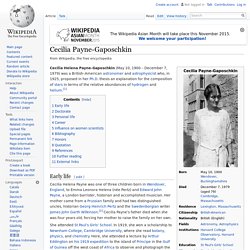
Her mother came from a Prussian family and had two distinguished uncles, historian Georg Heinrich Pertz and the Swedenborgian writer James John Garth Wilkinson.[2] Cecilia Payne's father died when she was four years old, forcing her mother to raise the family on her own. She attended St Paul's Girls' School. In 1919, she won a scholarship to Newnham College, Cambridge University, where she read botany, physics, and chemistry.
Doctorate[edit] Personal life[edit] In 1931, Payne became an American citizen. Career[edit] Awards. Eunuch. A eunuch (/ˈjuːnək/; Ancient Greek: εὐνοῦχος) is a man who (by the common definition of the term) may have been castrated, typically early enough in his life for this change to have major hormonal consequences.
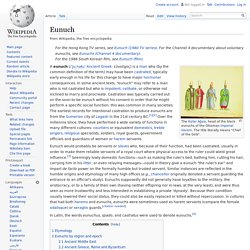
In some ancient texts, "eunuch" may refer to a man who is not castrated but who is impotent, celibate, or otherwise not inclined to marry and procreate. Subaltern (postcolonialism) In critical theory and post-colonialism, subaltern is the social group who is socially, politically, and geographically outside of the hegemonic power structure of the colony and of the colonial homeland.
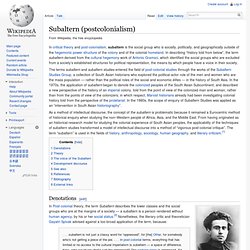
In describing “history told from below”, the term subaltern derived from the cultural hegemony work of Antonio Gramsci, which identified the social groups who are excluded from a society’s established structures for political representation, the means by which people have a voice in their society. The terms subaltern and subaltern studies entered the field of post-colonial studies through the works of the Subaltern Studies Group, a collection of South Asian historians who explored the political-actor role of the men and women who are the mass population — rather than the political roles of the social and economic élites — in the history of South Asia. Robert Mugabe. Robert Gabriel Mugabe (/muːˈɡɑːbiː/ moo-GAH-bee; Shona pronunciation: [muɡaɓe];[needs tone] born 21 February 1924) is a Zimbabwean revolutionary and politician who is the President of Zimbabwe.
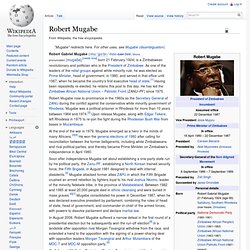
As one of the leaders of the rebel groups against white minority rule, he was elected as Prime Minister, head of government, in 1980, and served in that office until 1987, when he became the country's first executive head of state.[1] Having been repeatedly re-elected, he retains this post to this day. He has led the Zimbabwe African National Union – Patriotic Front (ZANU–PF) since 1975. Robert Mugabe rose to prominence in the 1960s as the Secretary General of ZANU during the conflict against the conservative white minority government of Rhodesia. Mugabe was a political prisoner in Rhodesia for more than 10 years between 1964 and 1974.[2] Upon release Mugabe, along with Edgar Tekere, left Rhodesia in 1975 to re-join the fight during the Rhodesian Bush War from bases in Mozambique. Early life St. Pharisees. Alawi. The Alawites, also known as Alawis (ʿAlawīyyah Arabic: علوية), are a prominent mystical religious group, centred in Syria, who follow a branch of the Twelver school of Shia Islam but with syncretistic elements.
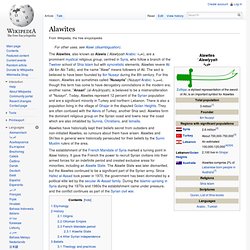
Alawites revere Ali (Ali ibn Abi Talib), and the name "Alawi" means followers of Ali. The sect is believed to have been founded by Ibn Nusayr during the 8th century. For this reason, Alawites are sometimes called "Nusayris" (Nuṣayrī Arabic: نصيرية), though this term has come to have derogatory connotations in the modern era; another name, "Ansari" (al-Anṣāriyyah), is believed to be a mistransliteration of "Nusayri".
Today, Alawites represent 12 percent of the Syrian population and are a significant minority in Turkey and northern Lebanon. There is also a population living in the village of Ghajar in the disputed Golan Heights. Alawites have historically kept their beliefs secret from outsiders and non-initiated Alawites, so rumours about them have arisen.